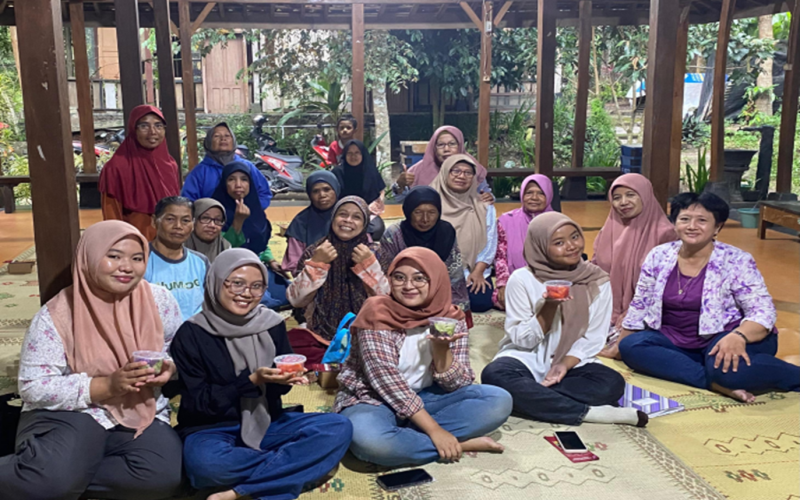[PkM – MBKM] On Saturday, May 18, 2024, The Community Service Independent Learning Independent Campus (PkM-MBKM) team, guided by Prof. Dr. Kumala Dewi, M.Sc.St., conducted an educational event on Antioxidant-Rich Food Crops in Blotan Village, Wedomartani, Sleman. The event was attended by 15 representatives from the PKK group and participated by four students from the Faculty of Biology, namely Cika Aprilia Hendriana, Wafiq Nur Azzizah, Nayla Rasya Nareswari, and Della Thasya L.S.. The event aimed to increase public knowledge about the importance of antioxidant-rich food crops for health.
The event was led by Prof. Dr. Kumala Dewi, M.Sc.St., a plant physiology expert from the Faculty of Biology UGM. She explained in detail about antioxidants and their ability to protect body cells from free radicals, which can cause various diseases such as heart disease, Alzheimer, and Parkinson. In her presentation, Prof. Dr. Kumala Dewi, M.Sc.St., discussed several antioxidant-rich food crops, including colorful fruits and vegetables like purple sweet potatoes, strawberries, purple cabbage, and kale leaves. Many of the participants were unaware that kale is known as a superfood due to its rich nutritional content. It reported that 70 grams of raw kale leaves contain about 33 calories and various essential nutrients, including carbohydrates, fiber, protein, vitamins K, A, and C, and minerals such as calcium, potassium, magnesium, zinc, iron, and phosphorus. Kale also contains omega-3 fatty acids, manganese, thiamin (vitamin B1), riboflavin (vitamin B2), niacin (vitamin B3), and various antioxidants, such as beta carotene, flavonoids, and polyphenols. Notably, kale contains high levels of the unique flavonoids quercetin and kaempferol. These nutrients help maintain overall health, including heart health, eye health, diabetes prevention, and cancer management. In the following program, there will be a demonstration of kale cultivation in Blotan Village.
At the end of the presentation, a discussion session was held on the importance of nutritious food to prevent stunting in children. The event also included a hands-on practice of making fruit and vegetable salads rich in antioxidants. This session aimed to allow participants to experience antioxidant-rich fruits and vegetables and to understand how to make simple antioxidant-rich salads quickly and easily.
This activity is part of the 2024 PkM-MBKM Program of the Faculty of Biology UGM, titled “Education and Sustainable Cultivation Practices of Food Crops and Fisheries through Urban Agriculture in Blotan Village, Wedomartani, Sleman, Yogyakarta.” This community service activity supports the Sustainable Development Goals (SDGs), particularly Pillar 2 (zero hunger) and Pillar 12 (responsible consumption and production). It hoped that this activity will continue to improve the quality of life for the community and support SDG pillar 3 (good health and well-being) for all.



